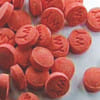Jails are becoming drug dens

The level of narcotic smuggling and trading that is reportedly taking place inside prisons across the country is really concerning. According to data from the Department of Prisons, disciplinary actions have been taken against at least 25 jail guards for drug trafficking in the past year alone, and these are just the ones who have been caught. Given the amount of money involved in the drug trade—particularly in prisons where drug prices are inflated—it can be assumed that the number of prison staffers, inmates and others involved in smuggling and trading drugs is much higher.
If we just look at the list of those who have been identified, there are clearly some big fish involved. One of the names that came out previously was the chief jail guard of Kashimpur High Security Central Jail in Gazipur. And the amount of narcotics, cash and other valuables found in possession of those detained shows how lucrative and widespread drug smuggling has become. According to a former jail doctor, a huge number of inmates at the Dhaka Central Jail are drug addicts. It can be assumed that inmates of other jails are also taking narcotics frequently.
Often, jail staffers allegedly "manage" their supervisors with money to ensure a smooth supply of drugs into prisons. According to a former inmate, the drugs are sold mainly by notorious criminals and influential inmates, who pay a certain amount of "toll" to jail guards and officials. Given that our prisons are saturated with inmates—accommodating over 82,000 against a collective capacity of 42,866—with one third of them accused in drug cases, it can be concluded that these establishments are turning into drug dens.
In addition to using jail staffers and inmates, criminals are also using innovative ways of smuggling, such as by involving locals to throw packets of drugs inside jails at certain times. This means that the authorities need to take a holistic approach to address this problem, including stronger surveillance using both technology and manpower. More CCTV cameras need to be set up, random searches need to be increased, and activities of officials must also be strictly monitored. These steps are critical to ensure that the state's correctional facilities properly rehabilitate prisoners—as these are intended to—rather than allowing them to be hotbeds of drug trading and addiction.


 For all latest news, follow The Daily Star's Google News channel.
For all latest news, follow The Daily Star's Google News channel. 









Comments